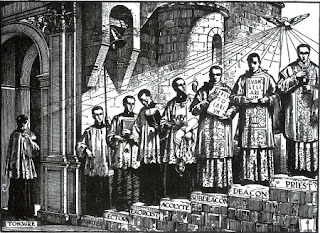The Ministry of Lector
On Thursday, July 14, at the Cathedral of St. Patrick in Charlotte, I, along with the other 14 men currently in formation for the permanent diaconate will be instituted as lectors by Bishop Peter Jugis. The Rite of Lector will be celebrated during the deacons’ annual re-commitment Mass at 6:30pm. The Mass is open to the public and anyone in the area is welcome to attend.
What is an instituted lector?
In 1972 Pope Paul VI issued a motu proprio (a personal edict from the Pope) called Ministeria quaedam which removed most of these, leaving only lector and acolyte, which were now called “ministries” rather than “minor orders.” One now enters the clerical state upon ordination to the diaconate. The 15 men currently in formation for the diaconate in our diocese will be instituted as acolytes in the summer of 2017 and, God willing, ordained deacons sometime in 2018.
In the meantime, they will begin serving the Church as instituted lectors. The liturgical functions of the lector are outlined in the General Instruction of the Roman Missal (the document in the front of the Missal that, as the name implies, gives instruction and general norms for the celebration of the Mass).
The lector is instituted to proclaim the readings from Sacred Scripture, with the exception of the Gospel. He may also announce the intentions for the Universal Prayer and, in the absence of a psalmist, recite the Psalm between the readings (GIRM 99).
An instituted lector may also carry the Book of the Gospels in the procession in the absence of a deacon, sit in the sanctuary with the other ministers during Mass, and recite the antiphons during the Entrance and at Communion (GIRM 194-198). An instituted lector would also generally wear a distinctive vestment, such as an alb or cassock and surplice, when proclaiming the Word of God (General Introduction to the Lectionary for Mass, 54).
In addition to their liturgical function, instituted lectors also receive the responsibility from the bishop to “instruct children and adults in the faith and prepare them to receive the sacraments worthily.”
Those of you familiar with our campus ministry might be wondering what the big deal is about becoming an instituted lector. Don’t I, as a campus minister, already frequently read at Mass, lead the prayers of the faithful, instruct people in the faith and prepare them to receive the sacraments? The answer is yes, I certainly do those things, as do many other lay people in the Church serving in parishes, on college campuses, and in other environments.
But on July 14 I, with the other 14 diaconal candidates, will be instituted into a permanent ministry. Rather than being designated to perform these functions for a time, in a certain place, instituted lectors carry this responsibility for life and may perform their function anywhere in the Roman Rite. Thus, it is a fitting step on the way toward ordination into Holy Orders, which, like Baptism and Confirmation, leaves an indelible mark on the soul of the recipient.
Because of the importance of their ministry, instituted lectors are called to be especially devoted to the Sacred Scriptures so that they may faithfully hand on the Word of God and allow it to grow strong within their hearts and the hearts of those to whom they minister.
I ask you to join in prayer for myself and all those who are called to serve in this ministry. From the Rite of Institution of Lectors:


